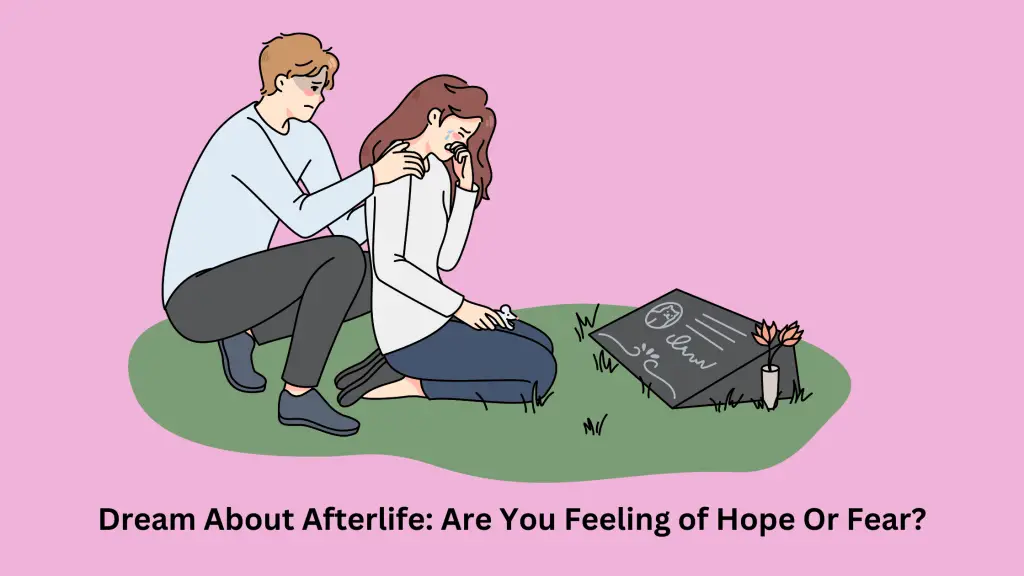
Many people dream of the afterlife and are always curious about what these visions might mean.
Generally, dreams about the afterlife can represent feelings of hope, fear, and uncertainty surrounding the concept of death and what lies beyond.
For some, these dreams may provide a sense of reassurance or solace, while for others, they might evoke anxiety or confusion.
Some people may feel hopeful about the afterlife, believing that it offers a chance for a reunion with loved ones or a continuation of existence beyond physical death.
Others may feel fearful, uncertain about what awaits them after death, or worrying about the possibility of punishment or negative consequences based on their actions during life.
The specific meaning behind each afterlife dream depends on the individual’s personal beliefs, experiences, and emotions.
What are the Afterlife Dreams?
Afterlife dreams are a unique category of dreams that involve experiences and encounters related to the concept of an afterlife or life after death.
These dreams can have a profound impact on those who experience them, often sparking deep emotions and inspiring reflection on one’s mortality, spiritual beliefs, and life purpose.
Difference Between Regular and Afterlife Dreams
While regular dreams can cover a wide array of themes and scenarios, afterlife dreams specifically focus on the notion of life beyond our physical existence.
They may include elements such as communication with deceased loved ones, visits to ethereal realms, or even interactions with divine beings.
There are distinctive features that set afterlife dreams apart from regular dreams.
In general, afterlife dreams tend to be more vivid, emotionally intense, and memorable than typical dreams.
Some individuals even report a sense of time distortion, where an afterlife dream feels like it lasts much longer than a regular dream, despite both occurring during a similar timeframe.
Neuroscience and Dream Studies
There is ongoing research in the fields of neuroscience and dream studies to better understand the nature and origins of afterlife dreams.
Some researchers propose that afterlife dreams may be influenced by our brain’s attempt to make sense of the concept of death and the unknown.
Others suggest that they could be related to our mind’s capacity for imagination and creativity, allowing us to explore different facets of our psyche and spiritual beliefs.
- Dream Research: Various methods, including sleep and dream journals, questionnaires, and interviews, are used to gather data on afterlife dreams.
This information can help provide valuable insights into the common themes and patterns found in these types of dreams.
- Neuroscience: By studying the brain activity of individuals experiencing afterlife dreams, researchers aim to learn more about the neural processes involved in generating these vivid and emotionally charged experiences.
This could reveal potential connections between afterlife dreams and specific areas or functions of the brain.
What Does It Mean When You Have Afterlife Dreams?
Afterlife dreams can be quite intriguing and thought-provoking.
There are many interpretations and theories surrounding these dreams, and understanding their meaning can provide insight into our subconscious minds.
Carl Jung’s Perspective
Afterlife dreams, according to Jung, may reflect our deep-seated thoughts and fears about death or represent a transition period in our lives.
He also emphasized the importance of considering the dreamer’s individual experiences and beliefs when interpreting afterlife dreams.
Dream Dictionary
Many people turn to dream dictionaries to help them understand the meaning of their dreams.
These resources typically offer interpretations for specific symbols and themes, often providing several possible meanings for afterlife dreams.
For instance, dreaming of being in the afterlife may represent:
- A feeling of closure or resolution
- Fear or anxiety about death
- A significant change or transition
- A desire for spiritual connection or growth
Symbolism in Dreams
In addition to specific interpretations found in dream dictionaries, analyzing the symbolism of afterlife dreams can offer further insight.
Symbolic events, such as a funeral, may represent the end of one phase of life or the beginning of another.
Conversely, encountering loved ones who have passed away might indicate a need to confront unresolved emotions or feelings of loss.
Overall, afterlife dreams can serve as a valuable tool for delving into our subconscious thoughts and emotions related to death, spirituality, and personal growth.
What are those Common Themes in Afterlife Dreams?
Heaven and Hell
One of the most popular themes found in afterlife dreams revolves around the concept of Heaven and Hell.
In these dreams, individuals may find themselves experiencing blissful or painful environments that are reminiscent of popular depictions of these eternal realms.
Some people may dream of floating on clouds in a peaceful paradise, surrounded by love and light, while others may have horrifying experiences in dark, punishing places filled with torment.
Reincarnation and Rebirth
Another common theme in afterlife dreams involves reincarnation and rebirth.
In these dreams, dreamers may witness hints of their past lives or imagine potential future lives, emphasizing a cyclical understanding of life and death where souls continue to grow and learn through multiple lifetimes.
These dreams might include encounters with people from previous lifetimes or visions of future lives, providing a sense that one’s existence extends beyond their current life.
Meeting Deceased Loved Ones
In afterlife dreams, people often encounter deceased loved ones, signifying the desire to reconnect with those who have passed on.
These dreams may evoke powerful emotions and provide comfort, as the dreamer is offered a chance to communicate with a lost family member or friend.
Dream of a Happy Afterlife
Many people dream of experiencing an idyllic afterlife, where there is no pain, suffering, or strife.
In these dreams, the dreamer might find themselves surrounded by nature, beauty, and happiness, reinforcing the hope that the afterlife will be a positive and fulfilling experience.
Dream of a Bad Afterlife
Conversely, some individuals might have dreams that suggest a less-than-ideal afterlife experience.
In these dreams, the dreamer may find themselves in a realm of discomfort, loneliness, or despair, as they confront various fears and insecurities related to the concept of the afterlife.
What are the Near-Death Experiences in Afterlife Dreams?
Near-death experiences (NDEs) are often reported in afterlife dreams, with people describing vivid encounters, life reviews, and encounters with deceased relatives.
Susan Blackmore, a researcher in the field, has studied NDEs and related phenomena such as out-of-body experiences (OBEs). This section explores these occurrences and their connection to spirituality.
Out-of-Body Experiences
Out-of-body experiences (OBEs) frequently occur alongside NDEs.
During an OBE, individuals feel as if they are floating outside of their physical body, observing the surrounding environment from an external perspective.
In the context of afterlife dreams, OBEs may be seen as a transitional phase between life and the afterlife.
Researcher Susan Blackmore has conducted extensive investigations into OBEs, attempting to determine their neurological basis and distinguish them from NDEs. Some theories suggest that OBEs result from the brain’s attempt to create a coherent representation of the self during moments of extreme stress or disorientation.
NDEs and Spirituality
Many people who experience NDEs during afterlife dreams report profound spiritual transformations.
Common themes include feeling a sense of unity with the universe, encountering beings of light, or experiencing a persuasive sense of love and acceptance.
According to some researchers, NDEs can intensify pre-existing religious beliefs or catalyze spiritual awakenings in previously skeptical individuals.
These experiences often result in lasting changes in attitudes, values, and personal beliefs. While the scientific underpinnings of NDEs remain a topic of ongoing research, the impact on the individual’s spirituality is undeniable.
In conclusion, afterlife dreams featuring near-death experiences and out-of-body experiences can have a significant impact on the individual’s perception of spirituality and the afterlife. What is The Role of Emotions in Afterlife Dreams?
The role of emotions in afterlife dreams is a complex and intriguing subject.
Dreams about the afterlife often reflect our innermost feelings and thoughts, including emotions like grief, desire, and stress.
Dealing with Grief
Grief is a powerful emotion that can manifest in afterlife dreams, particularly following the loss of a loved one.
These dreams can serve as a coping mechanism, offering the dreamer comfort and solace. In some cases, they might include encounters with the deceased, providing a sense of closure and reassurance.
Additionally, afterlife dreams allow individuals to process their grief by confronting their own mortality and exploring their beliefs about the afterlife.
Through such dreams, people can gain insights and come to terms with the transient nature of life.
Desires and Stress Relief
Afterlife dreams can also echo our desires for peace, happiness, and improved relationships with others.
These dreams may illustrate wish fulfillment, with dreamers envisioning an idealized world beyond life’s struggles and suffering.
Moreover, afterlife dreams can offer stress relief, functioning as an escape from pressures and anxieties in waking life.
By experiencing a serene and harmonious environment in the dream, individuals might be able to overcome their daily stressors and gain a renewed sense of emotional balance.
In conclusion, emotions play a significant role in afterlife dreams, touching upon aspects such as grief, desires, and stress relief.
These dreams not only reveal our emotional states but can also provide comfort, understanding, and self-awareness through their exploration of the afterlife.
Why do you dream of the afterlife?
Dreams of the afterlife can be a fascinating subject for many people.
There are several reasons why someone might experience these types of dreams, which we will discuss below.
The Cultural influence
Firstly, the afterlife is a common theme in various cultures and religions, leading to a heightened exposure to such concepts in our daily lives.
This cultural influence may seep into our subconscious and manifest in our dreams, giving rise to afterlife-related imagery.
The Human Mind
Additionally, the human mind often grapples with the concept of mortality and the unknown that comes with it.
Dreams about the afterlife may be a way for an individual to explore and make sense of their feelings surrounding life, death, and what may exist beyond our physical existence.
Personal experiences and emotions
Personal experiences and emotions can also play a role in shaping our dreams about the afterlife.
For example, the loss of a loved one may trigger dreams in which we explore the possibility of reuniting with them in the afterlife. Such dreams may provide a sense of comfort, closure, or even hope for those grieving.
Stress and anxiety
Furthermore, stress and anxiety may contribute to dreams of the afterlife.
As people face challenges and uncertainties in life, their subconscious may use dreams as an avenue to process these emotions, producing vivid images of the afterlife as a reflection of their inner turmoil.
In summary, dreams of the afterlife can result from a combination of cultural, personal, and emotional factors.
Whether it serves as a coping mechanism or a natural exploration of one’s own beliefs, these dreams can offer valuable insight into the subconscious mind and our understanding of life and death.
What to Do If You Dream of Afterlife?
Dreams of the afterlife often carry significant meaning, stirring deep emotions and prompting self-reflection.
Firstly, it’s important to reflect upon the dream and its possible meanings. Consider the symbolism, the emotions experienced during the dream, and any associations you may have with the afterlife.
Some common interpretations of afterlife dreams include fear of the unknown or addressing unresolved feelings about death and transition.
Next, engage in self-exploration to understand the underlying themes related to your personal development.
This may involve journaling or seeking professional guidance from a therapist, spiritual counselor, or dream expert.
Engaging in self-reflection can help you identify potential areas of growth, address any fears or anxieties, and work through unresolved emotions.
- Journaling: Write down your thoughts, feelings, and emotions after the dream. This helps you process the experience and make connections to your waking life.
- Therapy or counseling: Engage in conversations with professionals who can provide guidance and support as you explore the significance of your dream.
- Dream analysis: Delve deeper into symbolism and potential meanings to better understand the messages concealed within your dream.
In addition, exploring spiritual practices, such as meditation or prayer, can provide insight and guidance in understanding the dream’s significance.
Connecting with your spiritual self or a higher power may offer a sense of comfort, particularly when grappling with deep fears or anxieties related to the afterlife.
Ultimately, the key to navigating dreams of the afterlife lies in self-awareness and open-minded exploration.
Views on Afterlife Dreams
Religious Perspectives
In Christianity, the Bible often references dreams as a means for God to communicate with individuals.
Although the Bible does not provide explicit examples of afterlife dreams, they can still be interpreted as meaningful spiritual experiences for believers.
Additionally, the Bible describes an afterlife where one can expect eternal life and judgment.
Parapsychology Research
Parapsychology is the study of paranormal phenomena and psychic experiences, encompassing research into afterlife dreams as well.
While mainstream scientific research generally dismisses paranormal phenomena, including afterlife dreams, some pioneering researchers have delved into the field to gather evidence and offer alternative explanations.
Edgar Cayce, an American mystic in the early 20th century, conducted extensive research on various psychic phenomena, including dreams, visions, and reincarnation.
He attracted followers who believed in his ability to access information about the afterlife and provide readings on various subjects. Cayce’s work remains influential today among those interested in understanding paranormal experiences.
Top Takeaways
Dreams about the afterlife can be diverse and complex, reflecting a fascinating array of beliefs and emotions in the individual as they process their waking life.
Key influences on these dreams include cultural, religious, and personal factors, shaping the images and scenarios in which the afterlife appears.
It is not uncommon for these dreams to reveal deep-seated fears, unresolved grief, or spiritual curiosity.
When seeking to understand afterlife dreams, analyzing personal experiences, emotional responses, and recurrent themes can offer insight into the potential symbolism of the dream:
- Cultural influences: Dreams may reflect the specific beliefs about the afterlife in the culture the individual was raised in or identifies with.
- Religious beliefs: Personal faith and religious background often inform the imagery of afterlife dreams, for example, portraying Heaven or reincarnation.
- Emotional processing: Grieving the loss of a loved one, grappling with mortality, or seeking comfort in times of uncertainty may manifest in dreams about the afterlife.
- Insight and intuition: Some believe that afterlife dreams can provide guidance, opening channels to inner wisdom, or even psychic intuition.
Ultimately, whether you regard these dreams as spiritual messages, reflections of your unconscious mind, or simply the products of an active imagination, they can become valuable opportunities for self-discovery and personal growth.







